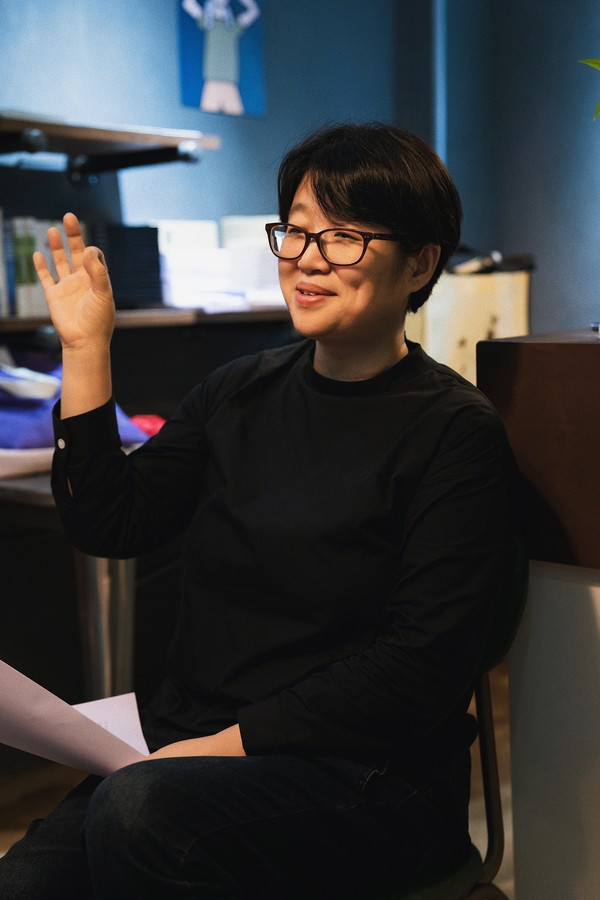
The steady seller Letterbox 110 (2004) touched the hearts of many readers with the phrase "I wish your love will be safe so that my love would be safe." I’ll find you on a beautiful day (2018), is another drama that captures the love of young men and women in ordinary daily life. What these two works have in common is that they were written by Lee Do-woo, who loves analog and vintage sensibilities. Her writing creates a unique emotional sentence and lyrical atmosphere, tickling and burning our hearts. Let's meet Lee Do-woo, a true writer of this era, who says that her limitations have created her today.
#Life As a CAU Student
1. Please introduce yourself!
Hello, I'm Lee Do-woo, an author born and raised in Busan. I entered Creative Writing major at CAU in 1988. After graduating from CAU, I worked as a copywriter for an advertising company and as a radio broadcasting writer, before starting writing my own novels. My published works are Letterbox 110 (2004), Put on Your Pajamas (2012), I'll find you on a beautiful day (2018), and the essay book Night is a Good Time to Talk (2020).
2. You must have taken various major classes as a Creative Writing major. Which class do you remember the most?
Students in the creative writing major will inevitably have a strong memory of “Seminar on creative writing” courses. That’s because, in class, we have a joint review where we show our poems and novels to our professors and colleagues to get feedback. Since it is the days of writing rough drafts, good reviews are rare, and we rather get sharp criticism often. At that time, I got a fresh experience: meltdown. However, I definitely think it was a valuable process of listening to various reviews, digesting them well, and turning them into my own fertilizer.
Another memorable experience was the mid-term examination of "Western Literature History.” The test method was very unique. We needed to read a short novel by a French writer and spent an hour summarizing the novel on one side of a B4 size paper. Then, for the next hour, we folded the paper in half and re-summarized it. In the hour after that, we wrote in the remaining paper space about commonalities and differences between the first and second summary. It took me total of three hours to complete the exam, and I can't forget it. It was so tough.
3. How did your college life affect your novels?
To be honest, it gave such a great impact. First of all, I left my hometown and began my 20s in an unfamiliar place: Anseong which has a rural landscape. The College of Arts, Creative Writing major is located at Anseong Campus. It was 1988, before Anseong was promoted to a city, and I loved the view of the back gate of the campus. Walking along a winding lane across paddy fields to go to my studio apartment, sightseeing houses growing cherry trees in the yard, watching dogs wandering in grapevine orchards and strawberry fields. That's when I realized my lifelong taste. I prefer low, quiet, and field places like here.
It was also good to interact with friends who dreamed of literature together. Personally, I wasn't the type to wander heavily, but I thought about it from their point of view while looking at my friends around me wandering. I think friends are people who witness each other's growth process and be witnessed at the same time. As we were caught by each other, we shared our experiences and thoughts directly and indirectly. These days, I often reflect on what I went through around that time. The characters I write in my novels nowadays seem to come from those experiences.
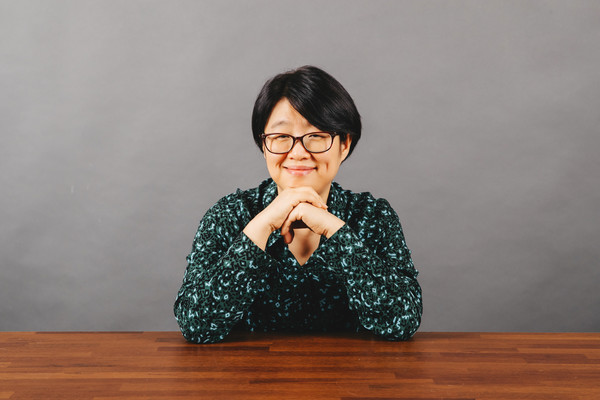
# A Career As a Writer
4. CAH is curious about your personal preference for publishing media and why!
I still like traditional paper books. I feel the texture, weight, and smell of paper books are also factors that makeup reading behavior. I want to call it the "physical properties of books." However, in these rapidly changing times, I am also actively using various media such as e-books and online novels.
Since I published my first novel online, I could clearly see the pros and cons. Above all, I thought that quick feedback from readers had impact on the progress of the story. However, the conclusion that I got after considering carefully was quite different. I didn't really want other people's intervention, such as readers and editors until I finish my work. I thought that I should push it in the direction I originally envisioned until the end but write it slowly enough so that my thought can reach the readers when the book comes out later. Therefore, after the first book, I haven't been serializing on the Internet at all. Though I'm not sure I'll continue my faith. I might want to ride a new wave just as the wind suddenly changes direction.
5. Many readers who love your books sometimes describe them as "Books I want to take out and read forever" and "Books I cherish.” What do you think is the secret to your book receiving such warm affection?
I am very grateful to the readers who think of my books like that. If there is one wish in writing, I want to write a book that makes people mutter, "that book comes to mind. I want to read it again.” when the season comes around, or when they feel something in their life. Not a book that people do not look at again after reading it very interestingly once. I want to make a book that people go to again suddenly when it rains or snows, or when they feel lonely.
The novel Letterbox 110 is a story about radio producers and writers that meet in their daily lives and find love, and I'll find you on a beautiful day is a calm drama-like story set in a small bookstore named Good Night Bookstore, in a rural village in Gangwon-do. There is no great event that catches the eye, but I think the process of the characters permeating each other, the stories of ordinary characters that "I might know," made readers comfortable. I want to write books that become a subtle background of the days of their life, and it’s the readers’ sympathy that makes a book more plentiful.
6. We are curious about the secret and driving force of your consistency in writing novels with such various themes and subjects.
In fact, I think I'm not that consistent. If I look at the average number of works and publishing terms of active novelists, I'm very slow and don't have many works. As a joke I say, "I am quite a slow writer because I only use inspiration to write." Whenever I don't like the introduction I wrote, I rewrite it over 10 or 20 times. Thus there are many cases where I rewrite half-written manuscripts. I don’t have a tendency to be prolific all my life like this. Instead, I tell myself to "never let go of it even if I am slow. Continue writing day-to-day." Of course, there are days, and months when I can't write a word. Nevertheless, in my head and mind, I keep imagining the story and replaying it. In the end, the answer would be, "To reach the reader, don't put it down."
7. What qualities or basic postures do you think a novelist or writer should have?
Regardless of whether I have those good qualities, I think observation, insight, and values are the basic elements. An author needs a point of view and observation of the world and humans, insight to interpret and analyze the observed objects, and a sense of value in what subject we implement and solve in our work. Since each artist has a different perspective, insight, and values, countless works were born with various genres, themes, and materials.
Therefore, being a fan of a writer often means the reader sympathizes with or agrees with the perspective and values of the world that the writer sees. It’s on a slightly different level from living in line with that view. Just as not all writers live in harmony with the world's scenery and characters that they have embodied and created. In addition, a certain talent for writing and persistence to continue steadily are necessary to become a writer.
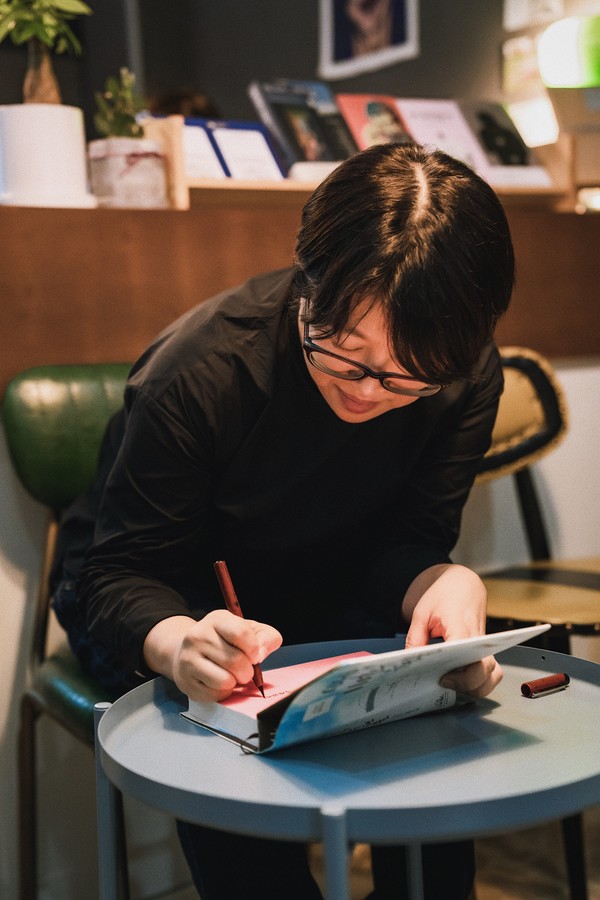
8. We wonder how you usually review your new writing.
There are two main types of parts when I think the manuscript needs to be revised. First is what I think instinctively from the time I start writing, "Oh, I'll eventually delete this part later." However, even if it's probably in the wrong direction I can't stop writing that part right away. That’s because I have to write it as a simulation to see if it’s wrong for sure. When I write it and realize that it was as expected, I deleted it without hesitation.
Another thing is that even though I first liked my writing of a specific scene, and felt it very precious, later as time passes, it became strangely rattling. The thing couldn't naturally blend in with other parts or clashed, or it artificially turned the hose on the total scene and made a mess. It's a case of “White Elephant,” which is a waste to throw away and is difficult to take, but I have to throw it away without hesitation. It's a shame at first, but after I keep writing, I learned how to part well with the parts that were "caught up with me because they were precious."
9. You have recently started an independent publication called Book Publishing Watermelon Sugar. What made you start such independent publishing?
I've liked the space with books since I was a child. Like Edward Ardizzone's attic with books drawing on the preface of Eleanor Farjeon's The Little Bookroom. While writing I'll find you on a beautiful day, I wanted to open a small independent bookstore such as Good Night Bookstore as a place to show my books to the world. Of course, the publishing industry is currently in a very difficult situation. However, the protagonist Eun-seop started publishing independently and posted on his private blog, "...I don't know if it's wise for me to start an independent publication, but I have to do what I want to do, and if I don't actually try it, I'll never know a life where I did it." I'm going to start with the same mind.
# Exploration of a Work
10. In the book I'll find you on a beautiful day, the name of the bookstore is "Good Night Bookstore," and the main character Eun-seop also likes night. As you wrote, do you like the night more than the day?
Rather than like the night more than the day, I have suffered from insomnia foremasts of my life. As a result, there were many days when I stayed up late at night, and I naturally imagined a virtual meeting called Good Night Club while reading or writing alone in that quiet time. Wouldn't it be fun or a little comforting to have a club in a virtual online space where people who are awake late ask each other how they are doing? That imagination became the seed from which I'll find you on a beautiful day grew.
11. What do you think is the difference between a novel and a poem? What is the attractiveness of a novel compared to poetry?
There is a saying that ‘If poetry is a dance, a novel is a walk.’ If poetry is a concentric wave that occurs when a stone is thrown into a lake, the prose is like the traces of pebbles that Hansel and Gretel drop, one after another, into the forest to find their way. Each genre has its own charm, so I also enjoy reading almost every genre as a reader. As a writer, I chose the ‘novel' medium and I think that suits me well. But because I love poetry so much, it would be an honor if certain poetic feelings could be incorporated into my novel like a certain pattern. There's a long way to go.
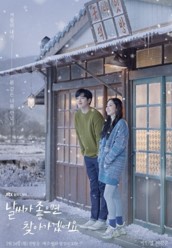
12. The book I'll find you on a beautiful day was made into a drama on JTBC. As the original writer, do you participate in the actual production process, such as recommending actors for a role or visiting the filming locations?
The process of novel dramatization is ‘case-by-case’, which can be explained in a variety of ways in theory, but based on my experience, I think the biggest issue is ‘timing.’ (Laughter) 18 years have passed since the publication of the novel Letterbox 110, and five film and drama rights contracts have been signed, but the results have not yet been released. On the other hand, I'll find you on a beautiful day was aired as a drama two years after its publication. I think the key is the timing when the conditions and agreements of various factors such as the original author, producer, broadcast media personnel, and the cultural trend of the time fit together. The degree of participation of the original author also varies from case to case, and there are times when the original author actively participates, such as writing the script or having script meetings together; or sometimes not participating at all because it is judged that books and videos are completely different genres.
13. In an interview with Interpark, you said, 'It hurts to draw the dark side of a human being.' How are you able to draw such realistic and beloved works that so many people can sympathize with, even if you exclude those things from your work.
With the so-called MBTI classification that is popular these days, I am an INFP person (laughs). I deeply sympathize with the wounds and feelings of people around me and sad social events. So I often fall into depression without realizing it. Sometimes, when I was suffering from painful news, there were times when I had hives all over my body the next day. I think it's a kind of defense mechanism. Instead of directly depicting or dealing with the dark side of human beings, cruel events, and painful phenomena in the work, I put them in a distant background by changing the tone with my own filter. In I'll find you on a beautiful day, there was domestic violence in the character's childhood. But instead of treating it as a full-scale theme and material, it was implicitly laid as a background. If there are writers who present things to readers like a vivid photograph, there are also writers who filter and present them with different tones. I think I would be the latter.
# Author Lee Do-woo’s Bookshelf
14. Do you have any tips or criteria for choosing the books you have? Also, if there is a book you would like to recommend to people in their 20s, what is it?
I tend to read extensively, so most best-sellers or steady sellers with good reviews are on my bookshelf. Apart from that, I also read a lot of books that are rarely advertised and sold very little. I think 80% of the criteria for choosing such a book is ‘taste’. If you keep yourself close to books, you will realize your own taste at some point. That is why I would like to tell people in their 20s to read books that are attractive to them at first sight, without worrying about 'what books should I need to read to get something worth the time I invested?’
The expression ‘cost-effectiveness’ is in vogue, but it’s better to give up the compulsion to choose a book just to acquire a lot of knowledge, culture, or emotion if possible. In addition, I hope not to be greatly influenced by the recommendations of celebrities. Of course, they will also recommend good and verified books, but sometimes, I have a lot of fun discovering hidden books that no one has noticed. I like famous trees and flowers that everyone knows, but I also like wildflowers that I accidentally met along the way.
15. In an interview with the Hoseo University newspaper, you chose a gothic horror novel as a genre you would like to write in the future. Horror and romance are quite new combinations, and CAH wonders if there is any novel that inspired you.
If there is something in common between gothic horror and romance, I think it must be ‘a certain type of expectation.’ People who like horror movies go to the cinema with anticipation of how scary it will be and how exciting it will be. The same goes for romance. So, if these two genres are combined, I think the synergy will be great. I like Daphne du Maurier's Rebecca. It's not a horror movie, but it's a psychological thriller with intriguing romance.
16. Do you have a material or background that you are currently planning to write?
I'm planning to write a book named Book Butler, which deals with the stories of butlers who manage and protect books. I am also looking forward to writing Underground Lighting Club. The work I'm writing now will be finished at the end of this year, so I think I will start The Book Butler right away. I've been thinking about it for a very long time. Since the draft I've collected for preliminary writing has already exceeded 2,000 copies, it's probably going to be very long. As it is my life's work, I want to write it with sincerity.
# Little More About Lee Do-woo
17. Do you have any special hobbies other than writing?
I'm shy, but I don't have any other special hobbies. It seems that I have lived my whole life reading books, listening to music, and watching movies. Even my small hobbies are derived from that. Like 'making a soundtrack for a novel' where I pick songs for my books... I also like people who travel and take travel photos to share. But I'm also a hermit rather than a traveler. (laugh)
18. Is there any place that has special meaning to you? How do the emotions and thoughts that a place evokes influence your work?
My unforgettable, special place is ‘Mangadae’ near Gongdo, Anseong. When I was in school, I lived with my friends behind the pear orchard there. In the spring, when the pear blossoms are in full bloom, the house is covered by trees and cannot be seen from the roadside. In that house that seemed to be hiding, I wrote my first full-length novel that became the first draft of the novel, Put On Your Pajamas.
I am the type that is greatly influenced by the place, and I think that is why I have been thinking for a long time about ‘where should I live’ and ‘what place should I be in.’ Then, at some point, a small realization came, and I put that feeling in the diary of the characters in the novel.
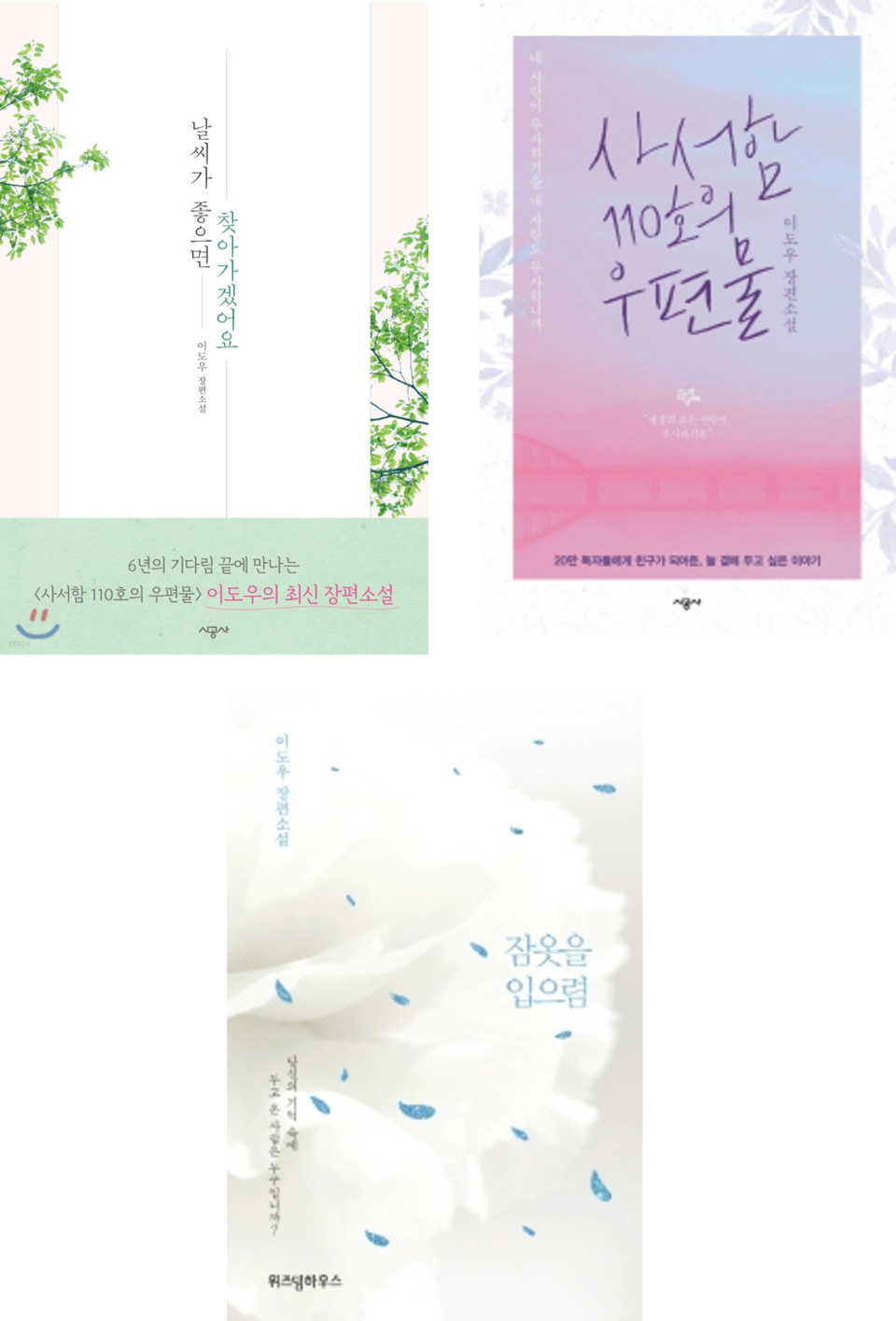
19. The cover of your novel seems to be characterized by several colors or objects rather than several pictures! CAH is curious about the main points you consider when choosing or designing a cover.
For most book covers, publishers and designers consult with each other to make several drafts, and the author decides with them together based on the results. I think that the designing skill is the domain of an expert, so I tend to respect the work of designers. The covers of my novels are simple and have a lot of emotional atmospheres, but I think they captured the feeling of the novel well.
20. What is Chung-Ang University to you?
It is the place I want to go back to all of a sudden. At the same time, a place where you want to say, “No, I don't want to go back to those complicated and confusing times.” My school is a physical space where I studied and lived, but it could be a metaphor for an intangible ‘space of time.’ It must have been a time of love and hatred that I miss and regret a lot. CAU was the name that embraced all of those things. I would like to thank the CAH for giving me precious memories of meeting my alumni and juniors through this interview.
In I'll find you on a beautiful day when the owner of the Goodnight bookstore reads his articles, he naturally becomes immersed in the novel and feels like a member of the bookstore. Author Lee Do-woo calls her novel 'a fantasy', saying that it contains romance and pure function, excluding the difficulties of a bookstore. She always puts 'human' in the novel in her own, beautiful way, causing great sympathy and emotion in readers. It's a fantasy, but somehow it doesn't seem like a fantasy, and her novel has the special charm of being "Lee Do-woo's novel." We conclude the interview hoping that you can feel the author's full warmth as much as in her novels.

